‘I had the world at my feet. Now I’m just another minor leaguer’: When a tragedy almost destroyed Michael Jordan’s career
Thirty years ago, the sports world found out that one of its stars was retiring from basketball to try his hand at baseball, a move whose true, tragic reasons only became known years later
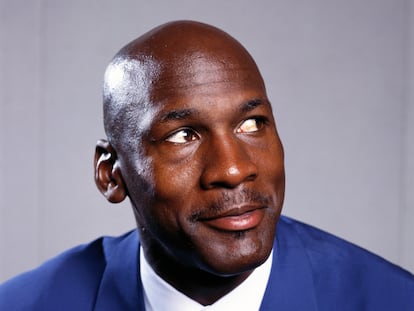

It happened on October 6, 1993. David Aldridge, from The Athletic, remembers it as one of the great blows in sports history. Michael Jordan, a 30-year-old athlete in his prime, was retiring after nine seasons of exceptional performance in the NBA, with three titles under his belt and the memory of the mastery displayed in his last final series, against the Phoenix Suns, still fresh. Why? Because he was not enjoying the game anymore. As Jordan Greer explained in Sporting News, that afternoon in October Jordan sat “in front of a horde of reporters” to tell them that professional basketball involved such a high level of demand that it simply could not be faced without the right motivation.
Also, he could not stand fame. He found it unbearable to feel like an object of adoration, not to have privacy, to be forced to devote a considerable part of his free time to posing with fans or signing autographs. Jordan took questions and handled the press with the full range of “his charisma, his thoughtfulness, his humor, his anger, his pettiness”; in Greer’s words, “the full version of MJ was on display.” With tears in his eyes, he said he was proud that his father had been able to witness his last game live. Jordan also hinted for the first time at a detail that was not taken entirely seriously: he was looking for new sporting challenges and was considering debuting in baseball, the sport he had played as a child, encouraged by his father, before opting for basketball.
The Bulls had no choice but to regroup hastily before the start of their first season without Jordan. The team seemed to be embarking on a long journey through the desert, but the sudden departure of the soloist spurred the rest of the orchestra. Under the “democratic” leadership of Scottie Pippen (who, now we know, hated Jordan for his overwhelming leadership style, his suspicions and his outbursts) the Bulls flourished against all odds.
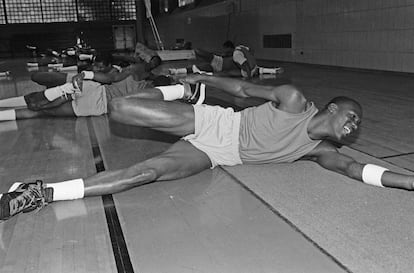
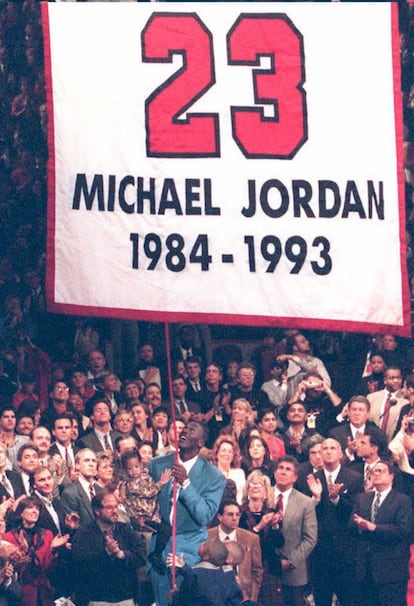
While all this was happening in Chicago, the deserter, as Greer explains, began to realize that life away from the top was not as idyllic as he had thought. In April 1994, in a now legendary interview with Ira Berkow of The New York Times, Jordan acknowledged for the first time that he missed high-level sports. He was training with the Birmingham Barons, an affiliate of the Chicago White Sox in one of baseball’s minor leagues, and he had already come to terms with the fact that his exceptional ability to play basketball might not be entirely transferable to other sports.
“Dude, I think we killed Michael Jordan’s father”
“For the last nine years, I lived in a situation where I had the world at my feet. Now I’m just another minor leaguer in the clubhouse here trying to make it to the major leagues.” His Southern League debut had been so disappointing that, according to the Barons’ coaching team, he agreed to continue training without competing until he was truly ready. But that was not happening. That interview with Berkow, moreover, was the first unequivocal sign that Jordan had not been totally honest about the real reasons for his retirement from the NBA six months earlier.
Jordan, in reality, had been suffering from severe undiagnosed depression since the death of his father in July 1993. He did not even have time to process the grief: he had just become champion for the third time and had multiple publicity commitments that he did not want to postpone. James Jordan Sr. had been murdered while he slept in his car at a rest area in Lumberton, North Carolina, after a long day playing golf. He was 56 years old. Two teenagers, Daniel Green and Larry Martin Demery, shot him to steal the brand new $50,000 Lexus SC400 that his son Michael had just given him.
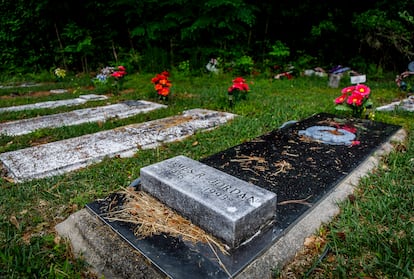
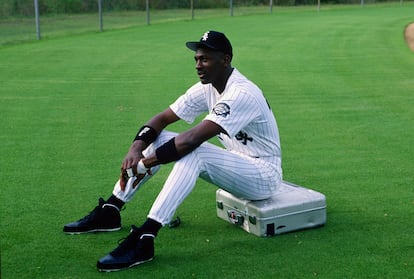
At the wheel of the vehicle, the murderers headed to a swampy area where they left the body. As they were going over the deceased’s documents, Demery noticed something disturbing: “Dude, I think we killed Michael Jordan’s father.” The homicidal duo was located very shortly afterwards, after using the victim’s phone to make a series of calls.
In his interview at the Barons’ training camp, Jordan confessed to Berkow that trying his hand at baseball was a sort of posthumous tribute to his father, as it had been his favorite sport. Michael used to practice both until he was 17, although around age 14, when he became the starting forward for his high school team, it was already clear that basketball was his thing.
In 1990, when his father noticed that he was going through a motivational crisis — Jordan told Berkow — he suggested that he follow the example of two legendary athletes, Bo Jackson and Deion Sanders, and play two professional sports at the same time. That did not seem realistic to Michael: he had a four-year contract with the Bulls, he was earning a multimillion-dollar salary and he was expected to take his team to the top. But he did take note: his father, the most influential person in his life, still wanted him to play baseball.
When that old dream finally came true, but transformed into a frustrating nightmare, Jordan persisted, he explained, by resorting to mental dialogues with his father: “‘Keep doing what you’re doing,’ he’d tell me. ‘Keep trying to make it happen. You can’t be afraid to fail. Don’t give a damn about the media.’”
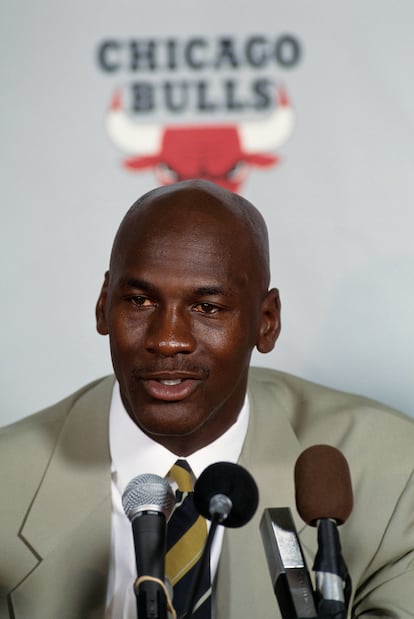
Jordan was able to persevere thanks to the generosity (or the keen business sense) of Jerry Reinsdorf, owner of both the Bulls and the White Sox. When Jordan sat down with Reinsdorf, a few days before his press conference in October 1993, to thank him for his trust and announce that he was leaving the NBA, the magnate offered him the possibility of joining the White Sox while maintaining the salary agreed upon with the Bulls.
Although Reinsdorf saw it as unlikely that Jordan would end up becoming a baseball superstar, he thought it would be a good move to keep him on the payroll as long as he was not only the most famous athlete, but also the most famous person on the planet. Eddie Einhorn, one of Reinsdorf’s main partners, agreed with the financially ruinous decision. Einhorn had a theory that Jordan was imposing some kind of irrational penance on himself for the death of his father, whom he felt had not mourned enough: “He’ll get over it. He will play basketball again. And when he does, we will be there, waiting for him.”
Place your bets, gentlemen
Sam Quinn, from CBS Sports, alludes to another, even more uncomfortable reason for Jordan’s erratic behavior in that crucial 1993. The player had developed a gambling addiction that had been brewing since his high school years and had become a real problem. Jordan himself confirmed it in the sixth episode of his documentary series The Last Dance.
During his years at the University of North Carolina, Jordan acquired the habit of betting much of the money that his mother gave him on pool or darts. Later, as the highest-paid athlete on the planet, he began to gamble “obscene” amounts in poker games with journalists in his circle, such as Sam Smith and Lacy Banks. He engaged on multiple bets with the Bulls’ security personnel, with members of the board of directors and even with teammates and members of the coaching staff.
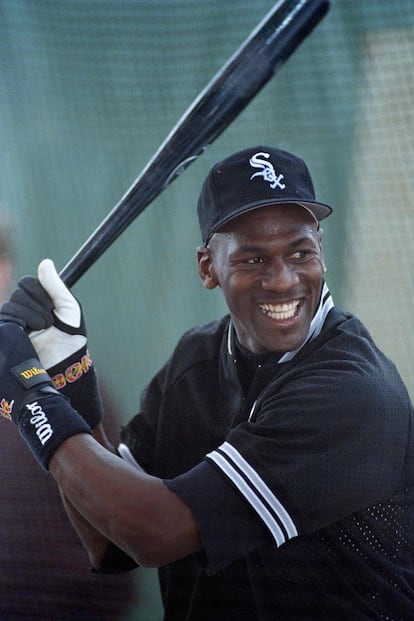
Pippen recalled years later that the best way to win Jordan over was to bet with him and, if possible, lose, because he loved having debtors and hated debts. His gambling addiction accompanied him until the end of his career (Quinn states that in 2001 he “ruined” teenage rookie Kwame Brown during his time with the Washington Wizards, to the point that the boy’s parents resorted to the club so it would intercede on his behalf before an inflexible Jordan, who intended to collect every last penny), but all indications are that he reached his peak around that fateful 1993 in which almost everything in his life fell apart.
In February, the athlete had to testify in a trial against drug trafficker James Silm Bouler, in whose possession a check for $57,000 with Jordan’s signature was found. Michael admitted before the judge that it had been the payment of a gambling debt. Two months later, in May, sports journalist Richard Esquinas published a book about his own gambling problem in which he stated that he and Jordan had been playing golf together for several years, betting increasingly large amounts. According to Esquinas’ story, at one point the ex-basketball player owed him more than $1 million, and he was reluctant to pay; he wanted to double the bet.
Jordan claimed that this was nothing but lies spread by an opportunist yearning for the spotlight, but he ended up reaching a private agreement to cancel the debt with a single payment of $300,000. At that time, it was also rumored that the mysterious injury that kept Michael off the court shortly before the playoffs started had actually been a covert sanction concocted by the NBA commissioner David Silver, who wanted to give him a warning without damaging his image.
A sequel that surpassed the original
The end of the story is well known. Pippen’s promising Bulls were not able to become champions in their first season without Jordan. They did their best, but were defeated by Patrick Ewing’s New York Knicks in an agonizing Eastern Conference semifinal.
The following season there was an alarming decline in his performance, and there were rumors that Jerry Reinsdorf was trying to convince Jordan to once and for all give up his absurd dreams of succeeding in baseball and his conversations with his dead father to return to the team and take it out of the hole. The news that everyone was waiting for came in May 1995 when Jordan released a brief statement, a work of sports marketing art: “I’m back.”
He placed himself under the command of Phil Jackson, his former boss, and spent the rest of the season displaying a disconcerting humility, even respecting the new hierarchies that had been consolidated within the team, praising Scottie Pippen’s “professionalism and commitment” and Toni Kukoc’s “huge talent.” That season there was no glory. A not entirely fit Jordan was not enough to regain momentum. The team fell again in the second round of the playoffs, this time against a brilliant Orlando Magic where a Bulls veteran, Horace Grant, had found a place.
But Jordan was himself again for the 1995-96 season. He shed the false humility, regained his voracity and killer instinct, and put the entire team, including Pippen and Kukoc, back at his service. Thus began the golden years in which he obtained three more titles and established himself as the best athlete of the 20th century — with the permission of Muhammad Ali.
The Brazilian national soccer team could not win the World Cup without Pelé in 1974, and Pippen’s Bulls could not reach the glory without Michael Jordan in 1994. They did enjoy shortly after, to the immense joy of the fans, a splendid second coming of Jordan. After a gambling addiction, latent depression, baseball, a dose of humility and the voices of his dead father echoing in his head, Jordan became, again, the best version of Jordan. And Pippen continued to add to his track record, even if it came at a cruel cost: assuming once more the role of the eternal squire of the man he detested.
Sign up for our weekly newsletter to get more English-language news coverage from EL PAÍS USA Edition
Tu suscripción se está usando en otro dispositivo
¿Quieres añadir otro usuario a tu suscripción?
Si continúas leyendo en este dispositivo, no se podrá leer en el otro.
FlechaTu suscripción se está usando en otro dispositivo y solo puedes acceder a EL PAÍS desde un dispositivo a la vez.
Si quieres compartir tu cuenta, cambia tu suscripción a la modalidad Premium, así podrás añadir otro usuario. Cada uno accederá con su propia cuenta de email, lo que os permitirá personalizar vuestra experiencia en EL PAÍS.
¿Tienes una suscripción de empresa? Accede aquí para contratar más cuentas.
En el caso de no saber quién está usando tu cuenta, te recomendamos cambiar tu contraseña aquí.
Si decides continuar compartiendo tu cuenta, este mensaje se mostrará en tu dispositivo y en el de la otra persona que está usando tu cuenta de forma indefinida, afectando a tu experiencia de lectura. Puedes consultar aquí los términos y condiciones de la suscripción digital.








































